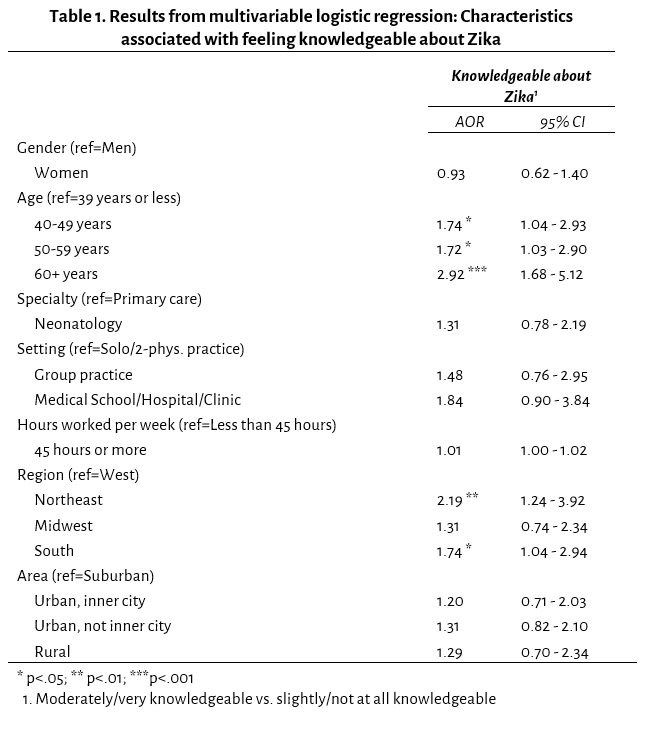Sisk, Blake1; Trevathan, Edwin2; O'Leary, Sean T.3; Needle, Scott4;Fisher, Margaret5; Houtrow, Amy6
1 Research, American Academy of Pediatrics, Itasca, IL, United States.
2 Vanderbilt University Medical Center, Nashville, TN, United States.
3 Pediatrics, University of Colorado Anshutz Medical Campus, Aurora , CO, United States.
4 Elica Health Centers, Sacramento, CA, United States.
5 Monmouth Medical Center, Long Branch, NJ, United States.
6 Physical Medicine and Rehabilitation , University of Pittsburgh, Pittsburgh, PA, United States.
Presented at the 2019 Pediatric Academic Societies Annual Meeting.
Background: In recent years, many health organizations and government agencies in the US have made efforts to inform and educate physicians about Zika virus. However, little is known about pediatricians’ Zika knowledge and preparedness.
Objective: To examine pediatricians’ self-rated Zika preparedness and to assess characteristics associated with feeling knowledgeable about Zika.
Methods: Nationally representative 2018 Periodic Survey of American Academy of Pediatrics US members (including primary care physicians and neonatologists). Analysis was restricted to post-residency respondents that provided direct patient care (analytic n=576). A multivariable logistic regression model examined characteristics associated with reporting being moderately/very knowledgeable about Zika (controls: gender, age, specialty, setting, area, region, and hours worked per week).
Results: Response rate was 42% (672/1599). There were no differences in response by gender or region, but respondents were somewhat older than non-respondents (46.1 vs 42.2 years). Overall, 39% of respondents reported being knowledgeable about Zika virus, and 47% reported being interested in learning more about Zika. Multivariable results (Table 1) indicated that characteristics associated with being knowledgeable about Zika included age and region. Relative to those ages 39 or less, pediatricians ages 40-49 (AOR=1.74, 95% CI=1.04-2.93), ages 50-59 (1.72, 1.03-2.9), and ages 60+ (2.92, 1.68-5.12) were more likely to report being knowledgeable. Respondents in the Northeast (2.19, 1.24-3.92) and the South (1.74, 1.04-2.94) had a higher likelihood of reporting being knowledgeable.
For preparedness (Fig 1), pediatricians reported feeling most prepared to inform patients of preventive measures (57%) and to provide travel advice (49%). Areas where pediatricians were less likely to report preparedness included recommending testing (22%), providing data to the CDC’s Zika Pregnancy Registry (16%), managing infants exposed to Zika prenatally (16%), and informing patients of social services for Zika-infected infants (15%).
Conclusion: Nearly 4 out of 10 pediatricians reported being knowledgeable about Zika virus, and there was considerable interest in learning more about Zika. While pediatricians felt most prepared to counsel patients, few felt prepared to perform Zika management and testing. Results indicate that additional education efforts are needed to grow the overall Zika knowledge of pediatricians and boost preparedness, particularly around recommending Zika testing and providing data to the CDC.

Last Updated
10/08/2021
Source
American Academy of Pediatrics